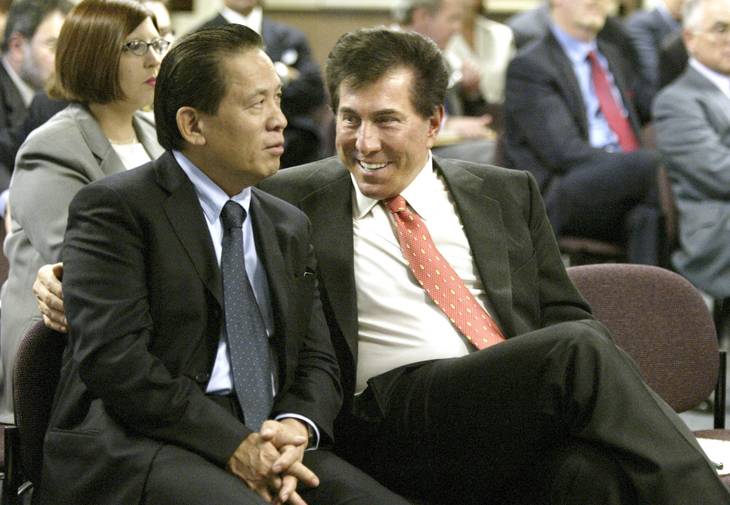Wynn Resorts Ltd. is disputing a key argument by dissident Wynn board member Kazuo Okada as Okada presses to be reinstated as the company’s largest shareholder.
As he heads toward an October court showdown with Wynn Resorts, Okada has challenged the company’s move in February to redeem his shares and replace them at a 30 percent discount with a $1.9 billion note.
Okada attorneys say the redemption was ineffectual as far as Wynn’s stated goal of protecting its valuable gaming licenses by removing a shareholder it views as unsuitable per casino licensing regulations.
He and his company, Aruze USA Inc., say that’s because gaming regulators look at equity and debt holders the same way in making suitability determinations
That’s not the case, Wynn Resorts attorneys said in papers filed Thursday in Clark County District Court.
"Contrary to Aruze’s contention, the Nevada Gaming Control Act makes a significant distinction between stockholders and debtholders of registered publicly traded corporations like Wynn Resorts," one of Wynn’s attorneys, veteran Las Vegas gaming lawyer David Arrajj, wrote in an affidavit.
He said that while a holder of 10 percent or more of voting securities in a public company must apply to the Nevada Gaming Commission for a suitability determination, debt holders are treated differently.
They "may be required to be found suitable" and then only if the commission has reason to believe ownership of such debt "would be inconsistent with the declared policy of this state," Arrajj said in his filing.
"Aware that forced cash redemptions could cripple a license or registrant, regulators have been willing to permit redemptions for debt," Arrajj said in his affidavit.
The issuance of debt to Okada rather than redeeming his stock for cash was done in part to protect the company’s finances, Wynn Resorts Chairman and CEO Steve Wynn said in his own affidavit filed Thursday.
"If, at the time of Aruze’s redemption, Wynn Resorts had been required to spend $1.9 billion in cash to buy out Aruze, the unnecessary drain on the company’s financial resources would have been against the interests of Wynn Resorts and its public stockholders," Steve Wynn said in his filing. "In effect, they would have suffered as a result of Mr. Okada’s illicit conduct."
Wynn Resorts reiterated in its filings that its board properly stripped Okada of his shares because Okada had improperly provided gifts to Filipino gaming regulators at a time he was developing a casino resort in the Philippines.
This Okada resort has been a source of friction between Steve Wynn and Okada, with Steve Wynn commenting about it in his affidavit.
"I personally had concerns about Mr. Okada since at least 2010 when I learned that he was trading on Wynn Resorts’ reputation as part of his plan to build a gaming resort in the Philippines — a plan the Wynn Resorts board told Mr. Okada it wanted no part of in February 2011," Steve Wynn said in his filing.
Wynn Resorts attorneys in their filings asked the court to reject a motion by Okada that his shares be reinstated so he can nominate two directors to the Wynn board for consideration during the company’s annual meeting in November.
"The fact is that the danger to Wynn Resorts’ licensing status posed by having Aruze as a 20 percent stockholder is significantly greater than having Aruze as a mere debtholder," the attorneys wrote in their filing. "In the seven months since the Nevada Gaming Commission was informed that Aruze had become a Wynn Resorts’ debtholder, the commission has never suggested to the company that this raises any issue."
While Wynn Resorts has accused Okada of wrongdoing, Okada has in turn questioned Wynn Resorts’ pledge to donate $135 million to the University of Macau, where it has a lucrative gaming license. Wynn Resorts and its directors have denied wrongdoing with this donation or any suggestion it was aimed at buying influence with officials in the Chinese gambling enclave.
Wynn Resorts, in the meantime, has nominated a new director to its board, apparently to replace retiring director John A. Moran.
He is J. Edward (Ted) Virtue, CEO of MidOcean Partners, a private investment firm. He formerly was a Deutsche Bank official and is an experienced investor and adviser in the gaming and hospitality industries, Wynn Resorts said.
The company has been threatening to act to remove Okada from the board, but it’s unclear when or if that will happen.
